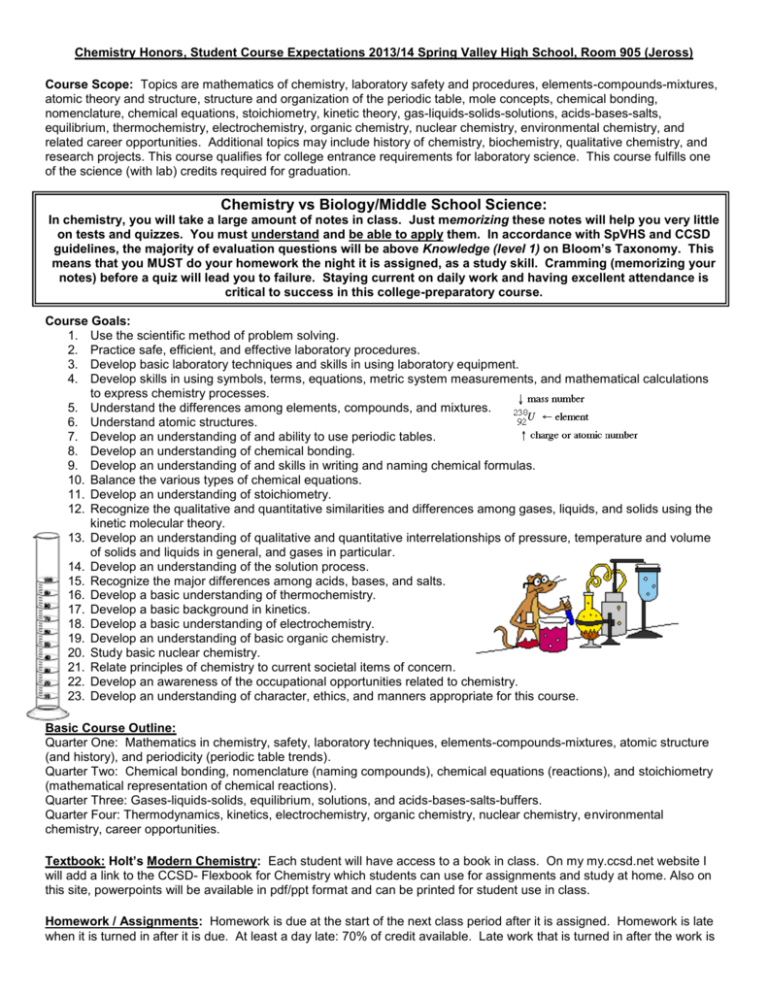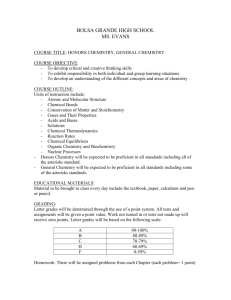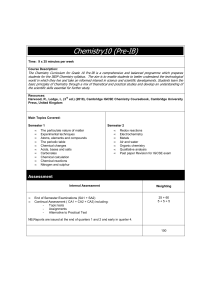Chemistry
advertisement

Chemistry Honors, Student Course Expectations 2013/14 Spring Valley High School, Room 905 (Jeross) Course Scope: Topics are mathematics of chemistry, laboratory safety and procedures, elements-compounds-mixtures, atomic theory and structure, structure and organization of the periodic table, mole concepts, chemical bonding, nomenclature, chemical equations, stoichiometry, kinetic theory, gas-liquids-solids-solutions, acids-bases-salts, equilibrium, thermochemistry, electrochemistry, organic chemistry, nuclear chemistry, environmental chemistry, and related career opportunities. Additional topics may include history of chemistry, biochemistry, qualitative chemistry, and research projects. This course qualifies for college entrance requirements for laboratory science. This course fulfills one of the science (with lab) credits required for graduation. Chemistry vs Biology/Middle School Science: In chemistry, you will take a large amount of notes in class. Just memorizing these notes will help you very little on tests and quizzes. You must understand and be able to apply them. In accordance with SpVHS and CCSD guidelines, the majority of evaluation questions will be above Knowledge (level 1) on Bloom’s Taxonomy. This means that you MUST do your homework the night it is assigned, as a study skill. Cramming (memorizing your notes) before a quiz will lead you to failure. Staying current on daily work and having excellent attendance is critical to success in this college-preparatory course. Course Goals: 1. Use the scientific method of problem solving. 2. Practice safe, efficient, and effective laboratory procedures. 3. Develop basic laboratory techniques and skills in using laboratory equipment. 4. Develop skills in using symbols, terms, equations, metric system measurements, and mathematical calculations to express chemistry processes. 5. Understand the differences among elements, compounds, and mixtures. 6. Understand atomic structures. 7. Develop an understanding of and ability to use periodic tables. 8. Develop an understanding of chemical bonding. 9. Develop an understanding of and skills in writing and naming chemical formulas. 10. Balance the various types of chemical equations. 11. Develop an understanding of stoichiometry. 12. Recognize the qualitative and quantitative similarities and differences among gases, liquids, and solids using the kinetic molecular theory. 13. Develop an understanding of qualitative and quantitative interrelationships of pressure, temperature and volume of solids and liquids in general, and gases in particular. 14. Develop an understanding of the solution process. 15. Recognize the major differences among acids, bases, and salts. 16. Develop a basic understanding of thermochemistry. 17. Develop a basic background in kinetics. 18. Develop a basic understanding of electrochemistry. 19. Develop an understanding of basic organic chemistry. 20. Study basic nuclear chemistry. 21. Relate principles of chemistry to current societal items of concern. 22. Develop an awareness of the occupational opportunities related to chemistry. 23. Develop an understanding of character, ethics, and manners appropriate for this course. Basic Course Outline: Quarter One: Mathematics in chemistry, safety, laboratory techniques, elements-compounds-mixtures, atomic structure (and history), and periodicity (periodic table trends). Quarter Two: Chemical bonding, nomenclature (naming compounds), chemical equations (reactions), and stoichiometry (mathematical representation of chemical reactions). Quarter Three: Gases-liquids-solids, equilibrium, solutions, and acids-bases-salts-buffers. Quarter Four: Thermodynamics, kinetics, electrochemistry, organic chemistry, nuclear chemistry, environmental chemistry, career opportunities. Textbook: Holt’s Modern Chemistry: Each student will have access to a book in class. On my my.ccsd.net website I will add a link to the CCSD- Flexbook for Chemistry which students can use for assignments and study at home. Also on this site, powerpoints will be available in pdf/ppt format and can be printed for student use in class. Homework / Assignments: Homework is due at the start of the next class period after it is assigned. Homework is late when it is turned in after it is due. At least a day late: 70% of credit available. Late work that is turned in after the work is checked= 50% of total points available. These percentages are based upon the points/credit you would have received based on the quality of your work. Complete late or make-up work as soon as you can after an absence to avoid being overwhelmed by the continuing class content. Assignments turned in without student name will not be accepted and graded as late. Grossly incomplete assignments (less than ¾ complete, or showing no work/calculations) will not be graded. Grading Policies: Because this class is advanced coursework in science, your participation each day is key to your success in class (as it is in life). Peer grading is used in this course. Your minor assignments will be graded by students, so learn to write legibly and understandably. Late assignments will not be accepted after the unit test for the unit content they cover. In other words, after the day of the unit test, no late work will be accepted for that unit. Grade weight: The final grade in the class will be a composite of 70% assessment grades (test/quizzes, labs, and projects) and 30% daily work (in class work and homework). Note about unit tests: Each test after the first unit test may have questions from past tests. Do not mentally bury unit content after you take a test. Rather than last-minute cramming for quizzes, plan to review and study new material each day. Test Retake Policy: Science Department Re-Testing Policy: Teachers in the Science Department expect our students to study prior to the announced dates of all tests and quizzes. Students will be allowed to re-test twice per Quarter, to exclude Lab Practicums, end-of-Quarter Tests, Semester Finals, and open-notes assessments. The re-test must be requested and completed in a timely manner (no more than one week after scores are posted on ParentLink). The second version will not be the same as the first, but will cover the same subject matter and will be of the same general format. Teachers may decline a student’s request to re-test if an honest effort was not made on the original assessment (e.g., the student made no attempt to answer essay or short-answer questions), and may require that a student complete a brief review of the relevant subject matter before granting a re-test. You will be required to do test corrects and bring a note from your parents acknowledging that they know you did not do well on the original test and are going to retake the test. The new test score will replace the original score even if it is a lower score so be sure to study!! Semester Exams: Your semester exams in chemistry will be a collection of questions taken from past tests and quizzes. Quarter Grades: Your points are totaled dynamically each week. Please check you grades periodically online. The grade breakdown for quarter grades is as follows: 89.6-100% A 79.6-89.5% B 69.6-79.5% C 59.6-69.5% D < 59.6% F Semester Grades: Your semester grade will be calculated from 40% each from your quarter grades and 20% from your semester exam. The resulting percentage will determine your letter grade for the semester, using the percentage breakdown shown above. Citizenship Grades: The following descriptions can be used to estimate your citizenship grades. If you feel you deserve a particular citizenship grade, you are welcome petition your instructor in writing with evidence and anecdotes. “O” = Outstanding: You have near-perfect attendance. You interact and contribute in class. You complete your required tasks and then help others that may need assistance. You volunteer to help setup/cleanup the lab, pass out papers, and whatever else needs doing in class. You glow with an otherworldly light. “S” = Satisfactory: You have decent attendance. You successfully exchange oxygen for carbon dioxide while remaining awake most of the class time. You are respectful of your classmates, your instructor, class equipment, and yourself. You are pretty much an average student. “N” = Needs Improvement: Your attendance shows 8 or more absences. You are struggling with the concept of proper behavior in a social system like a classroom and it shows in your attitude and actions in class. “U” = Unsatisfactory: You have more than 15 absences. You are disruptive and have been a part of a progressive discipline program. You completely fail to grasp the concept of proper behavior in a social system like a classroom and it shows in your attitude and actions in class. Absences: Absences can and will affect your grade. If you are going to be absent, get your work ahead of time. Even if you have an excused absence, you are responsible for your missed work. If you missed an assignment due to an excused (not unverified) absence you have three days from the time you return to complete that assignment. Further, unexcused absences can seriously impair your ability to pass this course, as outlined in your student handbook. If you miss a lab or class activity for any reason, you must come to class the next Friday after school within one week of the missed lab to makeup the lab. Bring a classmate with you (to help), but carry out the lab and collect your own data. NO STUDENT WILL BE ALLOWED TO WORK IN LAB BY HIM/HERSELF. Prior to turning in any late assignment, due to an excused absence, write “Absent” and the date, next to your name. Tardy: If you are not in your seat by the time roll is taken, you are tardy. You will be required to sign in on the tardy log when entering the class, within the first 30 minutes. After 30 minutes you are considered and marked absent. Consequences for being tardy too often will adhere to the Spring Valley High School tardy policy. Lab partnerships: You will be a member of a lab group of 2 to 4. Exchange phone numbers, email addresses, and internet chat/messenger names of your lab group and keeping that information handy. If you miss class, it is still your responsibility to get class content and makeup work. Lab partnerships will change throughout the year. A good lab partner is invaluable, and the best way to keep good lab partners is to BE a good lab partner. Most labs will be graded as assignments. Several FORMAL labs will be graded as Assessments. Lab Rules and Conduct: By enrolling in chemistry honors you have made a claim that you are mentally and emotionally ready for a real-lab-based class. Your conduct in the laboratory settings should be of the highest caliber. You will be warned if your behavior is unsatisfactory. A second behavioral hiccup will result in removal from the lab and a zero for the day’s portion of the lab grade. Any intentional behavior that puts yourself or a member of the class at physical risk will result in immediate removal from the lab and a zero for the lab, as well as possible removal from the class. Equipment: Respect all lab equipment and chemicals. Use only equipment you have been instructed to use. Do not use any lab equipment in a manner other than directed. If you are unsure how to use an apparatus, ask your instructor for assistance. Do not remove lab equipment, experiments, or chemicals from the lab, unless you obtain specific permission from your instructor to do so. Safety: What makes chemistry fun also makes it dangerous. You will be provided with a safety sheet outlining the safety rules. Read this sheet and have your parents/guardians read it. Your signature and theirs indicates that you and they have read the rules and you have agreed to follow them. No student will be allowed to do chemical-wet labs until he/she has turned in his/her safety sheet. Eye Protection: All students in the lab area must wear goggles when any student is working with any glassware, heated materials, or chemicals in the lab area. Goggles are provided for student use. You may purchase approved goggles for use in the lab. Be aware that wearing contact lenses in lab adds an additional layer of risk, as chemicals can become trapped between the contact lens and your eye. Removing goggles while in an active lab area, even for a short time, constitutes a behavior infraction and will be dealt with per the progressive discipline policy. Further, repeated violations of this goggle policy will result in loss of lab credit, parent contact and referral to the dean’s office for disciplinary action. Lab Attire: Avoid loose clothing that can sag and fall into the chemistry workspace. Such items can soak up chemicals, and transfer them to your skin. Long hair must be tied back during lab. No open-toed shoes or sandals are permitted in the lab area. Neck ties should be removed or tucked into shirts before working in lab. Failure to follow these rules will cause you to sit and observe from a distance rather than participate. Lab Breakage: Accidents happen, even in a chemistry lab. Being diligent and aware in lab will dramatically reduce potentially hazardous lab breakage. If your lab team is responsible for lab breakage, the entire team is responsible for a fee to help replace the equipment. If you witness or are responsible for glass breakage, DO NOT attempt to clean it up, until instructed to do so. Notify your classmates and instructor immediately and secure the area, but do not pick up the broken glass. A bruised ego is better than a lacerated hand. Lab Cleanup: Keep your lab area clean. You are responsible for your lab area. Prior to leaving the lab area, make sure the counter tops and floor are clear of paper or trash, clean and put away lab glassware and equipment (unless otherwise instructed), and wipe up excess water. If you refuse to clean your lab station appropriately prior to leaving the class, you will get the job of cleaning the entire lab the following day. Gum/Candy/Drinks/etc: Eating and drinking in a lab environment is not allowed. Preparedness: Be in your seat or working in lab promptly at the start of the class period. Have all applicable class materials with you as you enter the classroom. Don't come to class and expect me to allow you to return to your locker to pickup materials you neglected. No Sleeping in class will be allowed. Students that put their head down on their book/arm/desk during lectures will lose their chair privileges. Succeeding in Chemistry: Mathematics is a very important part of the sciences. This may be the first class you take that will require you to use algebra outside of a math class. If you struggle with mathematics, take it upon yourself to work out the in-chapter sample book problems to help familiarize yourself with the kinds of calculations that you will be doing in each chapter. Notes in Chemistry: You will take a great deal of notes from the whiteboard, overhead, and LCD screen during this course. Use the Cornell notes system. Learn to take only the notes you need. Three ring binders (2-3 inch) will be required and graded periodically. Computer Use in Chemistry: Computers are an integral part of chemistry education. You will collect and process data on computers. Lab computers are owned by your instructor. Please respect them. Computers with Microsoft Word, Excel, and PowerPoint are also provided in the library for your use. Computer time may be available during lunch, before and after school or as needed and reserved. Internet research (not copying…see below) will be required, so be sure you have a signed internet permission form turned in. Calculators and Cell Phones: You are required to have a scientific or graphing calculator in class. You may NOT use your cell phone as a calculator. Any use of your cell phone in class will result in its confiscation for the school day per school policy. Cheating: Copying another classmate’s work or being in possession of teacher materials (such as tests or grade keys) is cheating. If you are guilty of cheating, you will lose credit for the assignment, quiz, test, or project. Acts of cheating will result in parent contact and House administrator office referral. Progressive Discipline: The following sequence will be followed if student behavior necessitates intervention: 1st offense= verbal warning 2nd offense= student conference 3rd offense= parental contact via phone/email 4th offense= House administrator’s referral/rpc A few last thoughts about learning chemistry: I encourage you to see this class for what it is: a journey of exploration that requires a great deal of work, but one that rewards its completion with an equal amount of fun and satisfaction. Choose now to develop and practice good study skills. Possessing good study habits is usually the difference between chemistry being hard and chemistry being fun. (The same applies to college, by the way). A little info about your instructor: My name is Brett Jeross (“Mr. Jeross” while on campus) Education: Master’s Degree in Educational Administration: Wayne State University, Detroit, Michigan; Bachelor's Degree in Biology: Oakland University, Rochester, Michigan. Contact Information: Email: bajerosss@interact.ccsd.net







